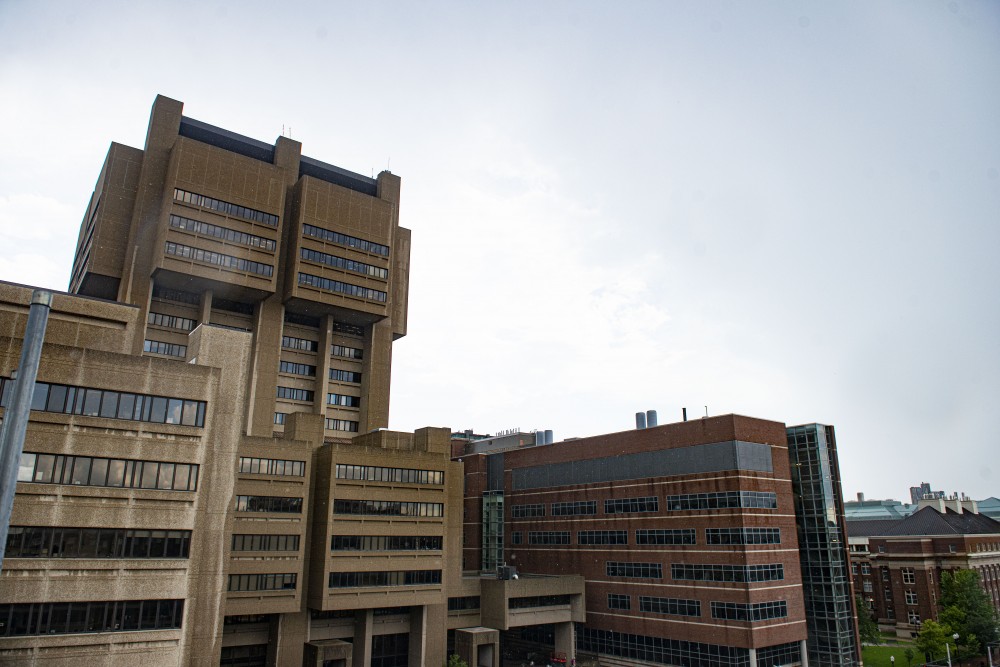While environmentalists and scientists debate pressing issues like renewable energy and climate change, University of Arizona professor Robert GlennonâÄôs concern is over a seemingly ubiquitous resource he believes nearly all AmericanâÄôs take for granted: water. Alongside a group of state water experts, Glennon spoke at the University of MinnesotaâÄôs St. Paul Student Center Monday to address what he described as AmericaâÄôs âÄúurgent water crisis.âÄù GlennonâÄôs presentation was followed by a panel discussion featuring Water Resources Center co-director Deb Swackhamer, department of forest resources research fellow Sherry Enzler, and Jim Stark. Robert Elde, dean of the College of Biological Sciences, and Gene Merriam, president of the Freshwater Society âÄî a Minnesota-based nonprofit organization focused on the conservation of water resources âÄî moderated the discussion. The central theme behind GlennonâÄôs argument was that Americans donâÄôt value water enough and treat it like a limitless and exhaustible resource. The event was organized by the Freshwater Society as a part of their ongoing education and outreach campaign to raise awareness about water conservation. According to a recent study conducted by the Arrowhead Water Quality Team, a typical household of four uses 260 gallons of water each day. A majority of that water is used for toilets, showers and faucets. The Arrowhead Water Quality Team is a collaborative effort involving six northern Minnesota counties and federal and state-level agencies. Evidence of a crisis âÄúWe Americans are spoiled,âÄù Glennon said. âÄúWe wake up in the morning and we turn on the tap and out comes as much water as we want for less than we pay for cell phone service or cable television.âÄù Echoing arguments from his 2009 book âÄúUnquenchable: AmericaâÄôs Water Crisis and What To Do About It,âÄù Glennon emphasized issues with steep increases in demand that have caused water shortages. He also addressed the issue of contamination and cited crisis scenarios that have occurred across the country. In October 2007, the water level at AtlantaâÄôs Lake Lanier âÄî the central water supply for residents in the Atlanta metro area âÄî was predicted to go dry in three months. As a result, Georgia issued a Level 4 drought emergency, prohibiting all outdoor watering except for agriculture and âÄúessential business uses.âÄù Georgia Gov. Sonny Perdue ordered businesses and utilities to reduce water use by 10 percent. Many experts claimed the crisis was caused by an ongoing drought, but after researching the incident, University of Georgia professor of water resources and hydrology Todd Rasmussen concluded that the drought was not particularly different from previous ones. Glennon argued that GeorgiaâÄôs problem comes not from a lack of water but from its uneven distribution. âÄúThe biggest problem is population,âÄù Glennon said. âÄúYou cannot name an environmental problem that doesnâÄôt come down to the fact that thereâÄôs too many of us.âÄù Another incident mentioned was Lake SuperiorâÄôs 2007 record drop in surface water level, which prevented cargo ships from passing through the shallow body of water. Glennon also mentioned a recent report that claimed Lake Mead, located near Las Vegas, could dry up within the next 20 years. The economy and alternative energy Glennon also stressed the importance of water as an âÄúeconomic lubricant,âÄù stating that, much like oil, water is essential for companies of all stripes, including automobile manufactures and industrial operations. The notion of water as a key component of economic well-being ties into the discussion of newly touted energy alternatives as well. Glennon was particularly critical of ethanol, stating that it currently takes four gallons of water to refine a single gallon of ethanol. In addition, it can take as much as 2,500 gallons of irrigated water to grow enough corn to produce a gallon of ethanol. These are glaring examples of a crisis that is growing more desperate by the day, Glennon said. Afterward, Glennon fielded questions from members of the panel and the audience. Swackhamer led the discussion by asking Glennon how the country can change individualsâÄô behavior. Glennon stressed the idea of using price signals, or even a water tax, as a way of motivating people to change their behavior. While there are all kinds of ways to help in the conservation of water, Glennon insisted there is no silver bullet to solve the crisis. But he said citizens can make simple changes to help the cause, like re-evaluating oneâÄôs consumption rate of water and not using bottled water. Merriam said there is a need for lifestyle changes among society. âÄúThe thing we preach is that we all have to take responsibility,âÄù Merriam said. Members of statewide environmental groups and initiatives were also in attendance. Jack Hogin, associate director of environmental projects for the Minnesota Environmental Initiative said that events of this nature are important because âÄúMinnesota has a special interest in water quality and quantity, both as a natural resource and recreationally.âÄù While the presentation may have stirred the audience, Glennon said he was optimistic about the future. âÄúThe crisis is real, but a crisis is a time for opportunity,âÄù Glennon said.
















